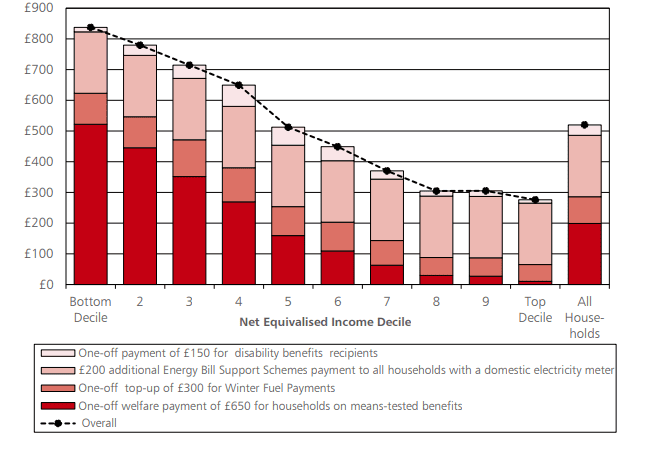Sunak's Energy Rebate Could be Deflationary: Deutsche Bank
- Written by: Gary Howes

Image © Adobe Images
The energy rebate could in fact prove deflationary says a leading UK economist, an assessment that goes against the standard assumptions surrounding fiscal boosts of the kind just announced in the UK.
Sanjay Raja, Senior Economist at Deutsche Bank, has assessed Chancellor Rishi Sunak's latest series of measures to try and ease the burden on households of higher energy bills and finds the measures could in fact knock inflation lower.
Standard economic theory suggests that the increase in fiscal and monetary supply into an economy, all else equal, is inflationary.
Therefore the fiscal boost of £15BN announced by the Chancellor on Thursday could be expected to boost inflation.
However Raja says the doubling and conversion of the energy bill rebate to a full grant lowers the bar for this spending to be captured by the ONS in the inflation statistics.
Sunak said the £200 loan to households announced earlier in the year to help with energy bills would be converted to a grant and that a further £200 grant would land in the accounts of all UK households by the autumn.
Raja says it is important to consider the conversion of the loan into a grant in the context of the Ofgem price cap, which is next set to rise in October (as a result of the price cap hike the Bank of England expects UK inflation to peak at this time).
"If this was indeed captured in the inflation statistics, the ONS would assume a lift in the price cap to GBP 2,400, instead of GBP 2,800 (netting off the energy bill rebate in its aggregate calculations)," says Raja.
He says this would reduce the Ofgem price cap uplift, currently slated to be 42%, to roughly 22% (i.e. just about half).
"In terms of the hit to aggregate inflation, the impact is material." Raja says this knocks nearly 70bps off from Deutsche Bank's October inflation projection alone.
But he does caution the ONS might yet opt to exclude this in their calculations.
"The energy bill rebate may still be considered an 'income adjustment' rather than a 'price adjustment'," he explains.
Only price adjustment would be considered 'in scope' in the inflation data.
"It will be very important to see is how energy suppliers include this in consumer bills. Should the rebate be included as a 'line item' in energy bills (and specifically as a discounted charge), the more likely it will be that it gets captured in the inflation data. We will waiting for further guidance on this," says Raja.

Above: Impact of measures announced in May 2022 on English households in 2022-23 in cash terms (£ per year) by income decile. Image courtesy of Pantheon Macroeconomics.
Analysis from Panmure Gordon meanwhile shows the targeted nature of the cash boost to UK households from the Government means it is unlikely to be massively inflationary.
"The redistributive nature of the Cost of Living package means less consumption spills into supply-constrained discretionary items with high price sensitivity to demand. Broad based inflation fears from this stimulus feel overdone," says Simon French, Chief Economist at Panmure Gordon.
Analysis shows by far the major beneficiaries of the give away will be the lowest income households who tend to have less discretionary income to direct spending on to a broader category of goods.
Indeed, if the majority of the cash grants go to energy costs the inflationary impact will be negligible.
Economists meanwhile warn that the prospect of any additional inflationary pressures resulting from these new measures will put pressure on the Bank of England to raise interest rates further than they currently might anticipate.
This in turn has implications for the Pound says French.
"If the passthrough of looser U.K. fiscal policy today, is marginally tighter monetary policy - as a number of forecasters have hinted at - then the current composition of inflation (largely imported) gets leant into by a stronger Pound, all else equal," he says.
A weaker Pound is inflationary in the sense it raises the cost of imports, which is highly inflationary for a net-importer such as the UK.
But the market will want to see a stronger economy underpinning higher interest rate expectations before putting a material bid under Sterling, which means the nature of the data following the Government's giveaway will be crucial to the currency's outlook.



